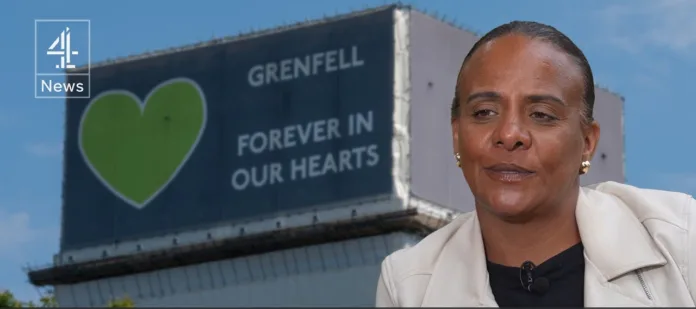Survivors of the Grenfell Tower fire face enduring trauma and inadequate support, as a new report reveals severe shortcomings in the emergency response and accommodation provided
Maryam Adam still trembles as she recalls the horror of the Grenfell Tower fire and the chaos that followed. At three months pregnant, she escaped the blazing inferno only to find herself abandoned and struggling in the immediate aftermath. Adam, now 48, describes the days following the tragedy as a time of profound neglect by both the council and the government.
The fire, which started in a fourth-floor flat of the 24-storey Grenfell Tower, turned into a catastrophic event, claiming 72 lives, including 18 children. The latest report from a seven-year public inquiry, released on Wednesday, exposed how survivors like Adam were “comprehensively failed” by the authorities.
The inquiry’s 1,700-page report, led by Sir Martin Moore-Bick, condemned the emergency response by the Royal Borough of Kensington and Chelsea (RBKC) and the government. It characterized their efforts as “muddled, slow, indecisive, and piecemeal,” revealing a profound lack of respect for human dignity.
Survivors were left without clear guidance or support, often having to seek refuge in community centres that opened in the absence of official help. Many felt like they were navigating a “horror film” or “war zone” as they tried to piece together information on their own. The report noted that residents, desperate to locate missing loved ones, faced feelings of “utter helplessness and despair.”
Adam, who was born in Somalia and raised in Sudan, had to flee the fire in slippers and pajamas. After briefly staying in a neighbor’s car, she sought refuge at the Clement James Centre, which had opened its doors to those affected. Despite receiving medical attention, she was left struggling to secure adequate accommodation. She eventually ended up in a hotel, where she faced further hardships, including sleeping on a mattress on the floor due to her pregnancy and the lack of consideration for her husband’s Ramadan observance.
The report highlights how Muslim residents were overlooked, with halal food not provided and dietary needs ignored. It pointed out that RBKC’s failure to accommodate cultural and religious requirements was part of a broader pattern of systemic neglect, particularly affecting minority ethnic communities.
Accommodation was also a significant issue. Survivors were placed in high-rise buildings or distant locations from hospitals, compounding their trauma. Families were often given inadequate spaces, with some sharing rooms or lacking essential items like cots. Confusion about available provisions led some survivors to unknowingly restrict their food intake, further adding to their distress.
The report also underscored the severe shortcomings in providing financial and psychological support. Some survivors, unsure of their entitlements, faced financial strain and had to return to work prematurely. Limited psychological support left many grappling with mental health issues without adequate help.
Elizabeth Campbell, leader of RBKC, issued an apology, acknowledging the council’s failures. She described the inquiry’s findings as a “withering critique” and pledged to learn from the criticisms. “We failed to keep people safe before and during the refurbishment and we failed to treat people with humanity and care in the aftermath,” Campbell said.
Adam and her family have since been rehomed in Kensington, where they are trying to rebuild their lives. However, the trauma of that fateful night continues to haunt her, with memories that leave her body shaking even today.
Analysis:
Political: The Grenfell Tower fire and its aftermath have significantly impacted political discourse, highlighting failures in crisis management and emergency response. The inquiry’s findings place substantial pressure on local authorities and government officials, revealing deep systemic issues. Politically, this failure underscores the need for better preparedness and accountability, influencing discussions on emergency protocols and the adequacy of local governance. The scrutiny also affects public trust in authorities, prompting calls for reforms to ensure more effective responses to future crises.
Social: The report sheds light on the broader social implications of the Grenfell tragedy, particularly regarding the treatment of marginalized communities. The lack of culturally sensitive support and inadequate emergency accommodation exposed deep-seated inequalities. Socially, the aftermath of Grenfell reflects broader issues of systemic neglect and the failure to address the needs of diverse communities in crisis situations. It highlights the necessity for inclusive planning and support mechanisms that cater to the needs of all individuals, particularly those from minority backgrounds.
Racial: The systemic failures identified in the report disproportionately affected racial and ethnic minorities, revealing a pattern of neglect that exacerbated their suffering. The lack of halal food and culturally appropriate accommodations for Muslim survivors indicates a broader issue of racial insensitivity and inadequate consideration of diverse needs. This aspect of the report underscores the urgent need for policies and practices that address racial and cultural differences, ensuring equitable treatment and support in times of crisis.
Gender: Gender issues are evident in the struggles faced by women, particularly pregnant women like Maryam Adam, who had to navigate inadequate support and accommodation. The report highlights how gender-specific needs, such as those related to pregnancy, were overlooked in the emergency response. Addressing gender considerations is crucial in disaster management to ensure that women’s specific needs are met, and that their experiences are adequately considered in planning and response efforts.
Economic: The economic impact of the Grenfell fire and its aftermath is significant, affecting both survivors and the broader community. Financial assistance was insufficient and poorly communicated, forcing some survivors back to work prematurely to make ends meet. The economic strain on affected families, combined with the costs of inadequate emergency response, highlights the need for better financial support systems and more effective resource allocation in crisis situations. Ensuring that financial assistance is adequate and accessible is essential for helping survivors recover and rebuild their lives.
